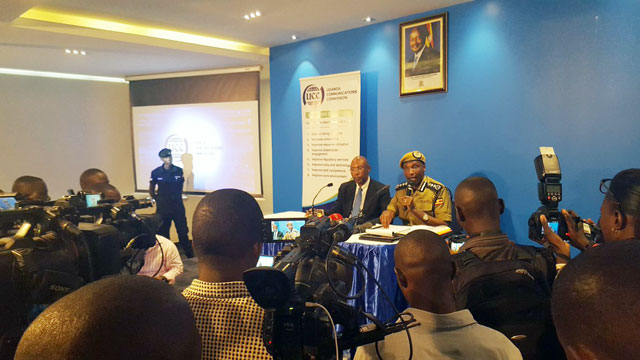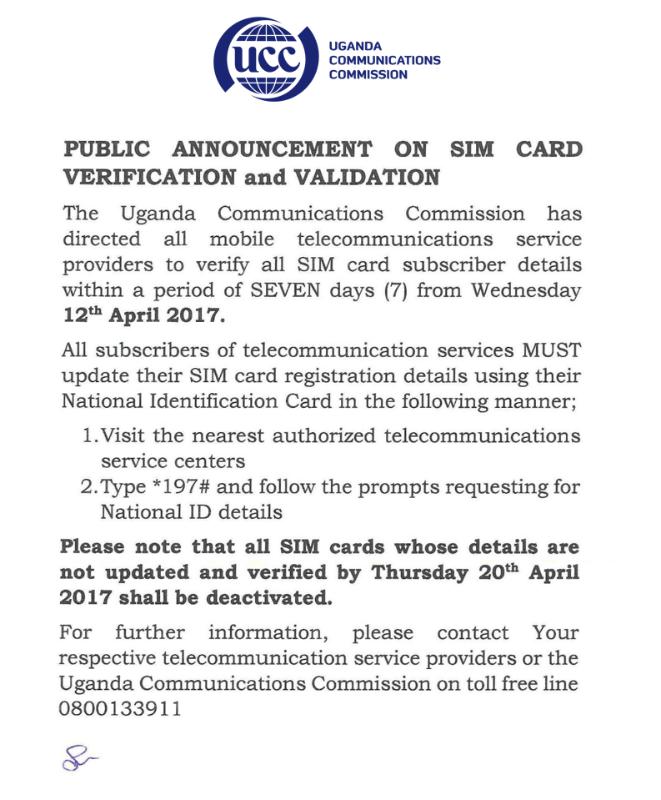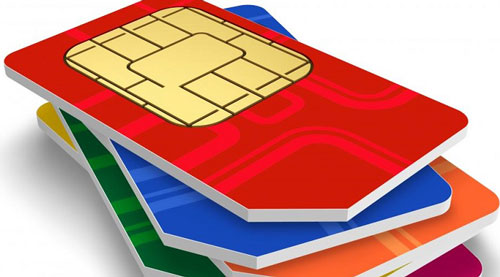
Uganda Communications Commission (UCC) has asked all existing subscribers to update their SIM-card registration information in seven days or they will be deactivated. National Identity Card (IDs) and passports, for the case of foreigners, will be used to verify, re-validate and re-register SIM-cards for all subscribers.
This is a shift from the position UCC had taken two weeks ago, in which they had said only new customer registrations for SIM-cards would be affected by the ID or passport requirement.
UCC made the announcement Tuesday at their headquarters in Bugolobi with UCC Executive Director Eng. Godfrey Mutabazi flanked by the Inspector General of Police Gen. Kale Kayihura.

There is unanimous and resounding consensus on the use of the National ID and Passport for verifying, validating and registering SIM cards. pic.twitter.com/wgJ5w1xquW
— UCC (@UCC_Official) April 11, 2017
The announcement came after a closed meeting between UCC, the telecoms, National Identification and Registration Authority (NIRA) and National Information Technology Authority (NIITA).
The meeting, Mutabazi said, had agreed that all existing subscribers should present their National Identification (IDs) or passports if they are foreigners to their operators for verification within seven days. Lists of verified subscribers by telecoms will be then be presented to NIRA for validation using their National ID database.
“Anybody who fails two verify their registration using a National ID within seven days will be switched off,” Mutabazi warned.
All subscribers should present their National ID’s to their operators for verification within 7 days #simcardregistration pic.twitter.com/lfG5yYtxXO
— Uganda Police Force (@PoliceUg) April 11, 2017
Refugees will have to be on the Office of the Prime Minister (OPM) database while companies will be verified via the Uganda Registration Services Bureau (URSB).
Two weeks back, UCC had ordered telecommunication companies to deactivate all unregistered or partially registered phone SIM-cards and stop selling pre-activated SIM-cards. There seems to have been a difficulty enforcing this, with the telecoms seeking police help now to implement it.

Mutabazi cited security concerns then for the new instructions, with Police warning that unregistered SIM-cards had been used by criminals, most recently before the murder of AIGP Felix Kaweesi.
The telecom operators on their part had requested access to the National ID database for verification of subscribers and SIM (subscriber identification module) registration.
This is the fourth deadline in Uganda related to SIM card registration the regulator is issuing to telecoms. The first closed in September 30, 2013 – after several extensions, and the second was in October 2015, and two weeks back.
****
editor@independent.co.ug
 The Independent Uganda: You get the Truth we Pay the Price
The Independent Uganda: You get the Truth we Pay the Price



The public announcement made by UCC was about SIM card verification and validation and not “re-registration.” Verifying means checking for the “truth” or “accuracy”, validation means “enforcing” or to make something legal. In this case, the question would be “The truth or accuracy, according to what? Or: Enforcing / validating what? In 2013, when the first SIM card registration was conducted, the “truth” was being based on, a National ID, Driving permit and a passport. Is the current process of verification and validation based on these facts? I am a Ugandan who did register using one of the three required documents. The new required process of “verification” and “validation” restricts me to only one requirement and that is, provision of the National ID (NIN). What happened to “my Driving permit” and “my passport?” What legal instrument “falsifies” or “invalidates” these national documents? And if that instrument is there, then, UCC’s public announcement should have included the option of “re- registration.”
My “queer mentality” thinks that there was a deliberate omission of the word “re- registration” so that the seven (7) days given seem to coincide with rather a simple process of “verification” and “validation” and not fit enough for the rigorous process of “re- registration.”
That said, there seems to be compete abandonment of state duties on the side of government. It should have been the Ministry of Internal Affairs that should have carried out the exercise of registration and not private telecom companies? If the state is to perform its duties on the mercy of private entities, then, why do we have a government in the first place? If there was “duplicity” in the first registration, what guarantees are in place to stop/prevent the same from happening? If “verification” is by “my NIN”, how sure are you that my NIN is not going to be duplicated by nine other “Ugandans” this time round? The criminals are within the “system” and are well “ahead” of the “system.” This is a “monkey dance” where Ugandans are being “invited” to attend but we are not aware of the rules, however, we are “obliged” to dance.